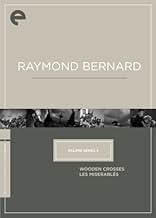ÉVALUATION IMDb
7,7/10
1,8 k
MA NOTE
La Première Guerre mondiale commence et un jeune homme s'engage afin de se battre pour son pays.La Première Guerre mondiale commence et un jeune homme s'engage afin de se battre pour son pays.La Première Guerre mondiale commence et un jeune homme s'engage afin de se battre pour son pays.
Raymond Aimos
- Soldat Fouillard
- (as Aimos)
Antonin Artaud
- Soldat Vieublé
- (as Artaud A.)
René Bergeron
- Soldat Hamel
- (as Bergeron)
Raymond Cordy
- Soldat Vairon
- (as R. Cordy)
Marcel Delaître
- Sergent Berthier
- (as Delaitre)
Jean Galland
- Capitaine Cruchet
- (as Galland)
Pierre Labry
- Soldat Bouffioux, le cuistot
- (as Labry Pierre)
Geo Laby
- Soldat Belin
- (as Laby Géo)
René Montis
- Lieutenant Morache
- (as Montis)
Jean-François Martial
- Soldat Lemoine
- (as J.F. Martial)
Marc Valbel
- Maroux
- (as Valbel)
Christian-Jaque
- Un lieutenant
- (uncredited)
Histoire
Le saviez-vous
- AnecdotesHistorian Georges Sadoul relates that the impression made by this memory of WWI was so powerful that one of the original combatants, seeing it on French TV in 1962,almost fifty years after the war, was disturbed enough to take his own life.
- Autres versionsThere is an Italian edition of this film on DVD, distributed by DNA Srl: "LE CROCI DI LEGNO (1932) + PER LA PATRIA (J'Accuse, 1919)" (2 Films on a single DVD). The film has been re-edited with the contribution of film historian Riccardo Cusin. This version is also available for streaming on some platforms.
- ConnexionsEdited into The Road to Glory (1936)
- Bandes originalesAve Maria
Written by Franz Schubert
Commentaire en vedette
What makes this film so impressive is its sinister direction, always kept at a calm distance but firm control by Raymond Bernard in visualizing a hell on earth worse than any hell imaginable, as it gives an all too convincing impression of never ending. The central battle scene in the middle of the film gives its definite stamp of a relentlessly realistic documentary in which category it outshines almost all the other first world war films including "All Quiet on the Western Front" (more personal), Rex Ingram's "The Four Horsemen of the Apocalypse" (more sentimental), Stanley Kubrick's "Paths of Glory" (more theatrical) Renoir's "The Grand Illusion" (more romantic) and "Oh What a Lovely War!" (musical). Not just the long great battle scene, but many scenes give the impression of going on forever, as they are so implacably sustained resulting in an overwhelming impact, like the dying corporal scene with Charles Vanel, who continued a long distinguished career in films with above Henri-Georges Clouzot in the 50s, and his death scene here is only a prelude to what follows - one can understand the veteran from that war who in 1962. when seeing the film on TV, committed suicide afterwards. It's all about ordinary men, good faithful soldiers, who keep on cheering and making the best of it as if the reality of the timeless horror was just something to accept as the ordinary, their natural cheerful moods and the irony of the absurd military self-deceit accentuating the superior quality of this film as the most realistic of first world war films.
- clanciai
- 7 janv. 2015
- Lien permanent
Meilleurs choix
Connectez-vous pour évaluer et surveiller les recommandations personnalisées
- How long is Wooden Crosses?Propulsé par Alexa
Détails
- Durée1 heure 55 minutes
- Couleur
- Rapport de forme
- 1.37 : 1
Contribuer à cette page
Suggérer une modification ou ajouter du contenu manquant

Lacune principale
By what name was Les croix de bois (1932) officially released in India in English?
Répondre






























